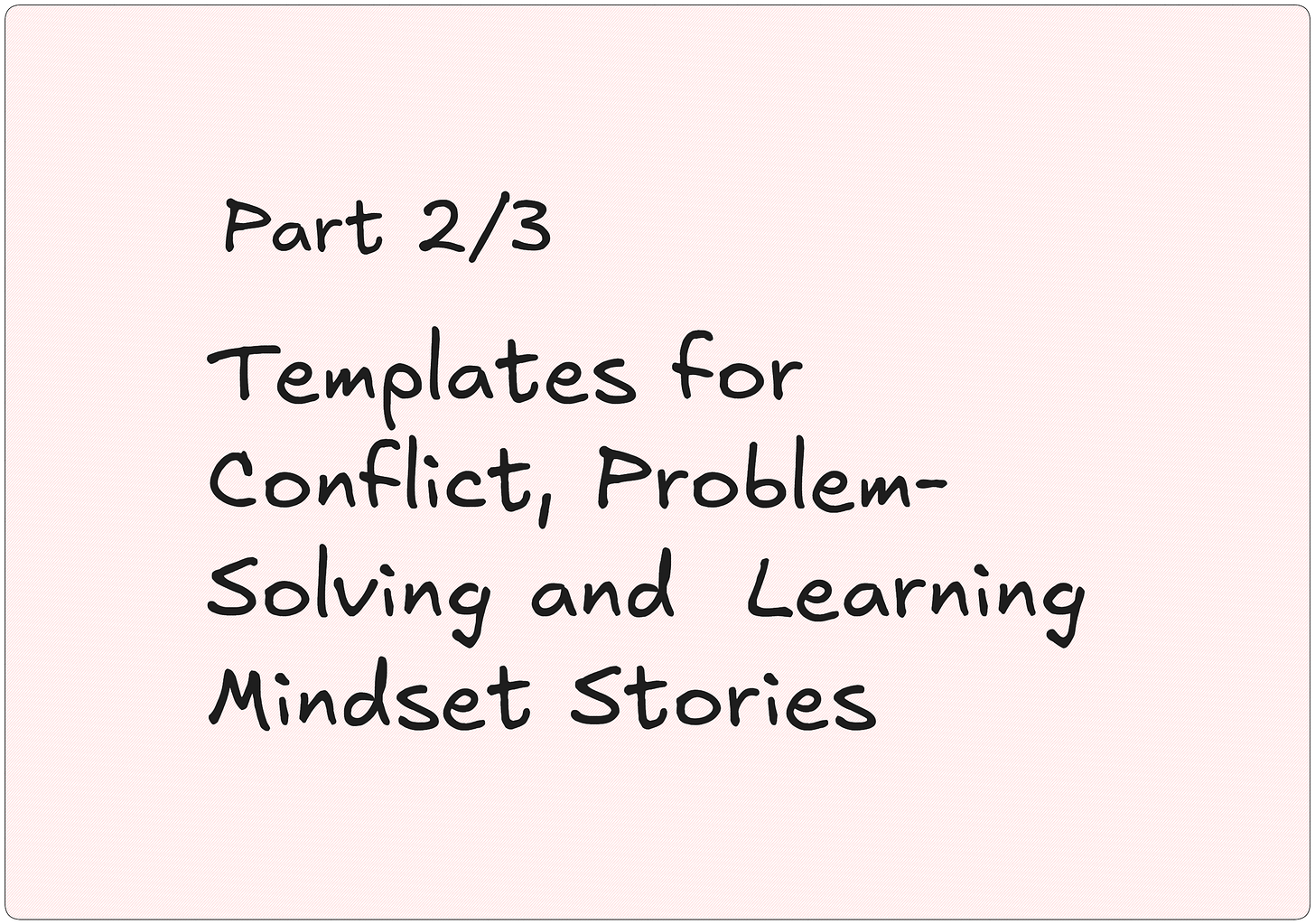Part 2/3 - Templates to Answer Behavioral Interview Questions
Templates for Conflict Story, Problem-Solving Story, Learning/Growth Mindset Story.
Hey, Prasad here 👋 I'm the voice behind the weekly newsletter "Big Tech Careers."
In this article series, I share templates to answer the most common behavioral interview questions. This is Part 2 of the series.
If you like the article, click the ❤️ icon. That helps me know you enjoy reading my content.
As you know, I categorize the behavioral questions in 8 key themes. In this article series, I’m providing the structure you can use as a template for each different behavioral category theme.
In part 1 of the series, I covered templates for the first 3 categories - Customer Focus Story, Success Story and Failure Story.
In this part 2 of the series, I will cover templates for next 3 categories - Conflict Story, Problem-Solving Story, Learning/Growth Mindset Story.
For each category, we'll examine a common question, provide a high-level structure to respond, and offer a detailed template based on the STAR format, along with important considerations.
Use these structures and templates as frameworks to craft your own compelling stories based on your personal experiences.
Let’s get started.
Conflict Stories
Question
"Describe a situation where you disagreed with a senior stakeholder. How did you handle it?"
High Level Structure to Respond
This happened during [specific project/timeline]
The stakeholder wanted [their position]
I believed [my position] because [reasoning]
I approached the conversation by [communication strategy]
We resolved it by [compromise/solution]
From this I learned [key insight about handling conflict]
Important Considerations
When sharing a conflict story, focus on describing the conflict objectively without vilifying any party, and emphasize the constructive steps you took to resolve the situation.
Showcase your ability to understand different perspectives, communicate effectively, and find common ground. Highlight how you maintained professional relationships throughout the process and the positive outcomes that resulted from the resolution.
The story should reveal your collaborative approach, maturity in handling difficult conversations, and commitment to achieving team success despite interpersonal challenges.
Detailed STAR based template
Situation:
This happened during [specific project/timeline]
The context was [relevant background]
The disagreement centered around [specific issue]
Task:
I needed to [what you needed to accomplish]
The stakeholder wanted [their position]
My perspective was [your position]
Action:
I first sought to understand by [listening approach]
I prepared [relevant data/information]
I approached the conversation by [communication strategy]
I focused on [common ground/shared objectives]
Result:
We resolved it by [compromise/solution]
The outcome was [specific result]
Our working relationship [how it was affected]
From this I learned [key insight about handling conflict]
Problem-Solving Story
Question
"Tell me about a particularly complex technical challenge and how you approached it."
High Level Structure to Respond
We encountered [specific technical issue]
I first diagnosed the problem by [analysis approach]
I considered [number] different solutions
I chose [specific solution] because [reasoning]
The implementation required [specific actions]
The outcome improved [metrics/results]
Important Considerations
Demonstrate your analytical thinking and methodical approach by clearly articulating how you identified the root cause of the problem and the systematic process you used to develop solutions.
Show how you leveraged data, collaboration, or technical expertise to inform your decisions. Emphasize the measurable impact of your solution and any efficiency gains or improvements that resulted.
The story should showcase your ability to tackle complex challenges, think critically under pressure, and deliver effective solutions that create lasting value.
Detailed STAR based template
Situation:
We encountered [specific technical issue]
This happened during [project context]
The impact was [business/user effect]
Task:
I was responsible for [specific role in solving]
The challenge was to [specific objective]
We needed to [constraints/requirements]
Action:
I first diagnosed the problem by [analysis approach]
I considered [number] different solutions
I evaluated options based on [criteria]
I chose [specific solution] because [reasoning]
The implementation required [specific actions]
Result:
The outcome improved [metrics/results]
We were able to [specific achievement]
The approach was [adopted/expanded/recognized]
This experience enhanced my [specific skill/knowledge]
Learning/Growth Mindset Story
Question
"Describe how you've grown as a professional in the last year."
High Level Structure to Respond
I identified a gap in my [specific skill/knowledge area]
Alternatively, for a project I had to upskill on [specific skill/knowledge area]
I sought improvement through [specific learning resources]
I practiced by [application method]
I received feedback from [source]
I demonstrated growth when [specific situation]
This development has helped me [broader impact]
Important Considerations
When sharing a learning or growth mindset story, focus on demonstrating your self-awareness and commitment to continuous improvement.
Describe a situation that pushed you beyond your comfort zone and how you embraced the challenge as an opportunity to develop. Highlight your openness to feedback and willingness to acknowledge knowledge gaps.
Detail the specific steps you took to acquire new skills or perspectives, whether through formal education, seeking mentorship, or self-directed learning. Emphasize how you applied this new knowledge to achieve better outcomes and how your growth benefited your team or organization.
Detailed STAR based template
Situation:
I recognized [specific limitation/opportunity]
This became apparent when [triggering event/realization]
The impact of this gap was [specific consequences]
Task:
I needed to develop [specific skill/knowledge area]
My goal was to [specific improvement objective]
This was important because [relevance to career/role]
Action:
I sought improvement through [specific learning resources]
I invested [time/effort details]
I practiced by [application method]
I received feedback from [source]
Result:
I demonstrated growth when [specific situation]
I now approach [relevant situations] differently by [new approach]
This development has helped me [broader impact]
I'm continuing to build on this by [ongoing development]
Transform these proven structures and templates into powerful personal narratives that showcase your unique experiences and strengths. Customize these frameworks with your own professional journey to create compelling stories that resonate with interviewers and set you apart from other candidates.
Next week in Part 3, I will share the structures and templates for the last 2 categories - Leadership Story and Time Management Story. Stay tuned!



Very nice framework, Prasad. Thank you